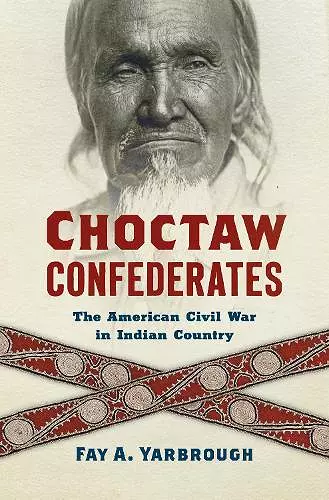Choctaw Confederates
The American Civil War in Indian Country
Format:Paperback
Publisher:The University of North Carolina Press
Published:1st Feb '25
£23.99
Supplier delay - available to order, but may take longer than usual.

When the Choctaw Nation was forcibly resettled in Indian Territory in present-day Oklahoma in the 1830s, it was joined by enslaved Black people—the tribe had owned enslaved Blacks since the 1720s. By the eve of the Civil War, 14 percent of the Choctaw Nation consisted of enslaved Blacks. Avid supporters of the Confederate States of America, the Nation passed a measure requiring all whites living in its territory to swear allegiance to the Confederacy and deemed any criticism of it or its army treasonous and punishable by death. Choctaws also raised an infantry force and a cavalry to fight alongside Confederate forces.
In Choctaw Confederates, Fay A. Yarbrough reveals that, while sovereignty and states' rights mattered to Choctaw leaders, the survival of slavery also determined the Nation's support of the Confederacy. Mining service records for approximately 3,000 members of the First Choctaw and Chickasaw Mounted Rifles, Yarbrough examines the experiences of Choctaw soldiers and notes that although their enthusiasm waned as the war persisted, military service allowed them to embrace traditional masculine roles that were disappearing in a changing political and economic landscape. By drawing parallels between the Choctaw Nation and the Confederate states, Yarbrough looks beyond the traditional binary of the Union and Confederacy and reconsiders the historical relationship between Native populations and slavery.
An award-worthy feat of research and writing. Its wide-ranging treatment of the Choctaw offers much needed expansion to a literature of Civil War-era Indian Territory that remains disproportionately focused on the Cherokee."—Civil War Books & Authors
"Deeply researched and cogently written history…Yarbrough's empathetic use of anecdotal material form the Indian Pioneer History Collection allows readers to experience events of the period through Indian eyes."—Civil War Times
"Scholars of the Civil War Era, the Civil War in the West, and those interested in race and slavery in Indigenous nations will undoubtedly find this deeply researched book immensely valuable and illuminating."—Civil War Book Review
"Historians of the Civil War and Reconstruction should read Choctaw Confederates and appreciate Yarbrough's important contribution."—H-CivWar
"Insightful. . . . Choctaw Confederates tells an important history that has too long been told from the vantage point of white outsiders."—Civil War History
"A much-needed corrective to scholarship on Native experiences during the Civil War era. . . . Yarbrough's study compellingly demonstrates that internal demands for the maintenance of slavery and the strengthening of tribal sovereignty drove the nation to support the Confederate war effort in 1861."—Journal of Southern History
"Yarbrough's study is an important contribution to the literature on Indigenous peoples and the Civil War era."—New Mexico Historical Review
"An important work that demands attention from Native and Civil War scholars. . . . [Yarbrough's] conclusions will without doubt inspire new research for years to come."—American Indian Culture and Research Journal
"Yarbrough's volume is a sorely needed historical accounting of the Choctaw and . . . centers ideas of indigeneity for further examination. . . . [V]aluable reading for faculty and others responsible for guiding readers through the history and entanglements of cultural identity of the peoples in the Americas who were here long before Europeans invaded and imported enslaved Africans to increase the land's profitability, with little regard for humanity."—Indigenous Religious Traditions
"Yarbrough's excellent monograph brings to the fore several critical and important debates in the larger scholarship of the Native South, particularly the development of racialized thinking and emergent anti-Blackness. Scholars of gender in Native North America will want to read this book for the author's innovative analysis of Choctaw masculinity. In sum, this book is a must-read for those interested in the history of the Civil War, Choctaws, the Native South, ideologies of race in Indian Country, gender roles, and tribal sovereignty."—Journal of the Native American and Indigenous Studies Association
ISBN: 9781469688336
Dimensions: unknown
Weight: unknown
280 pages